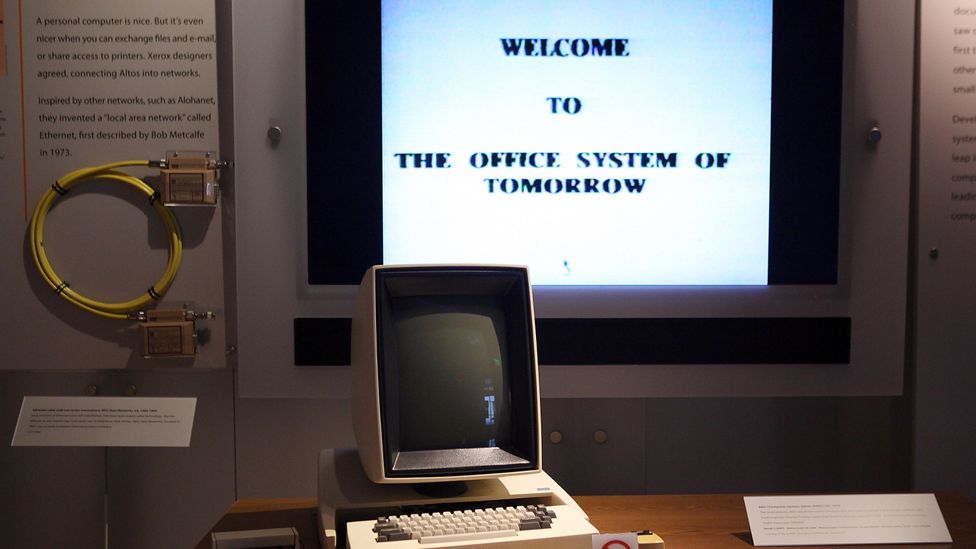- Joined
- Jun 9, 2020
- Messages
- 1,264
- Points
- 113
Shout out to the PAP. Don't get stuck in the cycle of cheap labour and immigration to boost GDP.
https://www.bbc.com/worklife/article/20200608-what-is-the-competency-trap
COLLECTIVE INTELLIGENCE | INNOVATION
How to avoid the ‘competency trap’
Share using Email
https://www.sammyboy.com/whatsapp:/...-competency-trap?ocid=ww.social.link.whatsapp

By David Robson
https://twitter.com/@d_a_robson
10th June 2020
Previous successes can stand in the way of new opportunities – and even lead to failures with big price tags.
***
If it weren’t for a monumental management failure, your computer, tablet or smartphone may well have carried Xerox’s logo.
In the early 1970s, the company’s photocopiers were ubiquitous throughout the world’s offices. The company’s name had even entered the English language as a verb – to photocopy was to ‘xerox’. But Xerox’s management were also interested in the potential of computing, and so they established a subsidiary to develop new technologies: the Palo Alto Research Center, aka Parc, in California.
By 1973, the scientists and engineers at Parc had invented a personal computer called the Xerox Alto. While the other early computers were cumbersome to operate, the Xerox Alto was very similar to a PC today, with a mouse to navigate an intuitive graphic user interface. Users clicked on icons and opened windows, without needing to type in commands to open a program. It included the first WYSIWYG (What-You-See-Is-What-You-Get) word processor, called Bravo, that allowed you to edit text on screen – all features that we now take for granted. The device was apparently so appealing that relatives of Parc’s employees would often come into the labs at night to get a glimpse of the future technology.
Mysteriously, however, Xerox failed to commercialise the product. As the company dithered, two young entrepreneurs called Steve Jobs and Bill Gates were inspired by what was happening at Parc and incorporated elements of the Alto into their own designs. The rest is history.

The Xerox Alto was far ahead of its time – but ‘competency traps’ ensured it was a missed opportunity (Credit: Getty Images)
“Xerox could have owned the entire computer industry, could have been the IBM of the nineties, could have been the Microsoft of the nineties,” Jobs later said.
How could the company have missed such a lucrative opportunity? Xerox had the funds to make a big investment as well as the brand recognition and the reputation – yet they failed to capitalise on the exciting new technologies.
“The company is blinded by its past success,” explains Loizos Heracleous at Warwick Business School in the UK. The inertia can be particular problem when facing a disruptive technology, he says. “At that point, competency traps can become deadly for a company.” Rather than growing and evolving, they begin to rot. And learning from companies like Xerox may prevent other organisations from suffering the same fate.
Exploitation and exploration
The causes of competency traps are perhaps best understood by considering the two, sometimes opposing, forces that drive a company forward: the ‘exploitation’ of their existing products, and ‘exploration’ of future opportunities. Each will require its own resources and investments, but if an organisation can balance both, management scientists consider it to be ‘structurally ambidextrous’. Like a person who is both right- and left-handed, the company uses both arms effectively without one dominating the other. For researchers like Heracleous, structural ambidexterity is thought to be the best way to ensure long and successful businesses.
A competency trap occurs when the exploitation arm comes to dominate the company’s workings so that it is no longer structurally ambidextrous.
There are many reasons why this can happen. Successful organisations often end up with rigid corporate cultures, for example. “In order to be successful, a company has to develop efficient systems and processes,” says Heracleous. “And over time, it leads to particular paradigms of what the organisation’s identity and core business is and should be.”

If you can run the existing operation while still exploring future opportunities, chances are your company is ‘ambidextrous’ (Credit: Alamy)
These assumptions about the ways the company operate can become so deeply embedded, the employees are no longer conscious of the tacit rules, he says. And those rigid attitudes can blind them to the potential of any future innovations.
Given the large investments that lie behind those systems, managers can also suffer from the ‘sunk-cost bias’ – the reluctance to give up on previous investments, even when they are no longer paying dividends, because they feel too attached to what they have already achieved. With this mindset, it becomes hard to embrace new technologies that threaten to uproot those investments.
A fight for resources can also result from toxic politics. Rather than seeing an R&D group like Parc as valuable insurance for the future health of the company, the staff in the ‘exploitation’ arm begin to see them as rivals who hoped to cannibalise their market.
This is particularly common in bigger organisations. “Due to their history and the dilution of responsibility and accountability, larger firms are more likely to develop the kind of inertia that comes with sunk investments, destructive politics and embedded worldviews rather than small, entrepreneurial companies,” says Heracleous. A company that was once nimble begins to turn to stone, forever locked into just one way of carrying out its business.
Leadership potential
There are many other examples of competency traps throughout the history of technology.
The AT&T Bell System (which evolved from Alexander Graham Bell’s original telephone company) began work on mobile communication in the 1940s. Technical difficulties prevented immediate commercialisation, but even after these had been surmounted, an organisational competency trap meant that the AT&T Bell System fell behind other companies including Motorola, who created the first hand-held cell phones.
Then there’s the photography company Kodak, which invented a 1.4 megapixel camera sensor in 1986. “It was the first company to create a digital camera, yet it seemed to play catch up when confronted with digital technology,” says Jie Mein Goh at Simon Fraser University in Canada. “It had a strong focus on chemistry research, an analogue process,” she explains – and so many of its workers were so entrenched in that industry, they struggled to see and exploit the potential of digital processing.

Some divisions within Kodak were at the forefront of digital camera technology, but the company chose to focus on film instead (Credit: Getty Images)
“Another factor was the organisational structure, where an upstart division that had yet to show results, had to work alongside the traditional business providing the cash flow and revenue,” Goh adds. As a result, the company continued to play it safe while other companies soon steamed ahead with the new technology. “Kodak focused on milking its cash cow – film – and was developing products that were tied to its cash cow.”
In terms of the sheer number of innovations it created, and then ignored, Xerox may be the most striking example of the competency trap, however. “Parc is legendary, having produced many of the technologies that we take for granted today,” says Heracleous, who recently sifted through historical records and interviews with Xerox employees to write a paper outlining the competency trap of the firm. “Yet Xerox’s leadership could not see their potential. It all went over their heads.”
Heracleous’s research suggests that initial communication difficulties contributed to the competency trap. It was a struggle, apparently, for the researchers in Palo Alto to even meet with the senior management. One insider said that a meeting with the CEO was like a “state visit” from a monarch. “You’d get fifteen minutes to pitch but there’d be no follow-through, no delegation to anyone who could understand what we were saying,” the source said.
And when they did listen, the managers were wary of taking a risk on an untested technology that would require a completely different pricing structure from their existing products. Xerox were used to building expensive machines which they rented out and then charged additional fees for the paper, ink and maintenance. (They essentially saw themselves as being like a razor manufacturer, which makes its profit from selling replacement blades.) By remaining tied to this way of doing business, the management failed to understand how you could profit from mass-produced consumer PCs – bought for a relatively low, single sum – without also making a profit from replacement goods.

Parc has been the home to many inventions we take for granted today – such as the computer mouse and the laser printer (Credit: Alamy)
At launch, the Xerox Alto sold for $32,000 – far beyond most customers’ price range. And despite repeated requests from the researchers at Parc, the management refused to fund the development of a more affordable version, instead spending their funds on the development of a new typewriter. Other companies quickly filled that void.
The firm’s failure to evolve led to many other missed opportunities, besides the company’s failure to capitalise on the Xerox Alto. Heracleous notes that a couple of the company’s researchers had also created some innovative publishing software, for instance. After Xerox failed to capitalise on the invention, the employees eventually bought the rights to their intellectual property for a mere $2,000, and founded their own start-up in 1982. That company, Adobe’s is current market value is around $191bn (£143bn). Xerox, in contrast, is valued at $4.2bn.
Lessons learned
Any company facing the competency trap may require an organisational overhaul, says Heracleous, to ensure that every manager is open to the potential of new innovations. One solution could be to encourage every employee to work within a research and development department for a few months, which should lead them to lose of cognitive rigidity that comes from their existing expertise, so they can be more open to new ways of doing things.
Leaders should make a special effort to listen to junior employees and new starters who might have a fresh viewpoint on the organisation procedures at the company, and to encourage all staff to question the underlying assumptions behind a company’s decision making. “What is crucial is to have ways to challenge the status quo, to inject variation in the corporate DNA,” says Heracleous.
To avoid fossilisation, you need to embrace evolution. And as Xerox learnt to its great cost, those lessons need to be learnt from the bottom to the top.
David Robson is the author of The Intelligence Trap, which examines why smart people (and businesses) act foolishly and the ways we can all make wiser decisions. He is @d_a_robson on Twitter.
https://www.bbc.com/worklife/article/20200608-what-is-the-competency-trap
COLLECTIVE INTELLIGENCE | INNOVATION
How to avoid the ‘competency trap’
Share using Email
https://www.sammyboy.com/whatsapp:/...-competency-trap?ocid=ww.social.link.whatsapp

By David Robson
https://twitter.com/@d_a_robson
10th June 2020
Previous successes can stand in the way of new opportunities – and even lead to failures with big price tags.
***
If it weren’t for a monumental management failure, your computer, tablet or smartphone may well have carried Xerox’s logo.
In the early 1970s, the company’s photocopiers were ubiquitous throughout the world’s offices. The company’s name had even entered the English language as a verb – to photocopy was to ‘xerox’. But Xerox’s management were also interested in the potential of computing, and so they established a subsidiary to develop new technologies: the Palo Alto Research Center, aka Parc, in California.
By 1973, the scientists and engineers at Parc had invented a personal computer called the Xerox Alto. While the other early computers were cumbersome to operate, the Xerox Alto was very similar to a PC today, with a mouse to navigate an intuitive graphic user interface. Users clicked on icons and opened windows, without needing to type in commands to open a program. It included the first WYSIWYG (What-You-See-Is-What-You-Get) word processor, called Bravo, that allowed you to edit text on screen – all features that we now take for granted. The device was apparently so appealing that relatives of Parc’s employees would often come into the labs at night to get a glimpse of the future technology.
Mysteriously, however, Xerox failed to commercialise the product. As the company dithered, two young entrepreneurs called Steve Jobs and Bill Gates were inspired by what was happening at Parc and incorporated elements of the Alto into their own designs. The rest is history.

The Xerox Alto was far ahead of its time – but ‘competency traps’ ensured it was a missed opportunity (Credit: Getty Images)
“Xerox could have owned the entire computer industry, could have been the IBM of the nineties, could have been the Microsoft of the nineties,” Jobs later said.
How could the company have missed such a lucrative opportunity? Xerox had the funds to make a big investment as well as the brand recognition and the reputation – yet they failed to capitalise on the exciting new technologies.
The answer may be a phenomenon known as the ‘competency trap’, in which a company’s entrenched expertise ruins its capacity to deal with a changing and uncertain market.How could Xerox have missed such a lucrative opportunity? The answer may be a phenomenon known as the ‘competency trap’
“The company is blinded by its past success,” explains Loizos Heracleous at Warwick Business School in the UK. The inertia can be particular problem when facing a disruptive technology, he says. “At that point, competency traps can become deadly for a company.” Rather than growing and evolving, they begin to rot. And learning from companies like Xerox may prevent other organisations from suffering the same fate.
Exploitation and exploration
The causes of competency traps are perhaps best understood by considering the two, sometimes opposing, forces that drive a company forward: the ‘exploitation’ of their existing products, and ‘exploration’ of future opportunities. Each will require its own resources and investments, but if an organisation can balance both, management scientists consider it to be ‘structurally ambidextrous’. Like a person who is both right- and left-handed, the company uses both arms effectively without one dominating the other. For researchers like Heracleous, structural ambidexterity is thought to be the best way to ensure long and successful businesses.
A competency trap occurs when the exploitation arm comes to dominate the company’s workings so that it is no longer structurally ambidextrous.
There are many reasons why this can happen. Successful organisations often end up with rigid corporate cultures, for example. “In order to be successful, a company has to develop efficient systems and processes,” says Heracleous. “And over time, it leads to particular paradigms of what the organisation’s identity and core business is and should be.”

If you can run the existing operation while still exploring future opportunities, chances are your company is ‘ambidextrous’ (Credit: Alamy)
These assumptions about the ways the company operate can become so deeply embedded, the employees are no longer conscious of the tacit rules, he says. And those rigid attitudes can blind them to the potential of any future innovations.
Given the large investments that lie behind those systems, managers can also suffer from the ‘sunk-cost bias’ – the reluctance to give up on previous investments, even when they are no longer paying dividends, because they feel too attached to what they have already achieved. With this mindset, it becomes hard to embrace new technologies that threaten to uproot those investments.
A fight for resources can also result from toxic politics. Rather than seeing an R&D group like Parc as valuable insurance for the future health of the company, the staff in the ‘exploitation’ arm begin to see them as rivals who hoped to cannibalise their market.
This is particularly common in bigger organisations. “Due to their history and the dilution of responsibility and accountability, larger firms are more likely to develop the kind of inertia that comes with sunk investments, destructive politics and embedded worldviews rather than small, entrepreneurial companies,” says Heracleous. A company that was once nimble begins to turn to stone, forever locked into just one way of carrying out its business.
Leadership potential
There are many other examples of competency traps throughout the history of technology.
The AT&T Bell System (which evolved from Alexander Graham Bell’s original telephone company) began work on mobile communication in the 1940s. Technical difficulties prevented immediate commercialisation, but even after these had been surmounted, an organisational competency trap meant that the AT&T Bell System fell behind other companies including Motorola, who created the first hand-held cell phones.
Then there’s the photography company Kodak, which invented a 1.4 megapixel camera sensor in 1986. “It was the first company to create a digital camera, yet it seemed to play catch up when confronted with digital technology,” says Jie Mein Goh at Simon Fraser University in Canada. “It had a strong focus on chemistry research, an analogue process,” she explains – and so many of its workers were so entrenched in that industry, they struggled to see and exploit the potential of digital processing.

Some divisions within Kodak were at the forefront of digital camera technology, but the company chose to focus on film instead (Credit: Getty Images)
“Another factor was the organisational structure, where an upstart division that had yet to show results, had to work alongside the traditional business providing the cash flow and revenue,” Goh adds. As a result, the company continued to play it safe while other companies soon steamed ahead with the new technology. “Kodak focused on milking its cash cow – film – and was developing products that were tied to its cash cow.”
In terms of the sheer number of innovations it created, and then ignored, Xerox may be the most striking example of the competency trap, however. “Parc is legendary, having produced many of the technologies that we take for granted today,” says Heracleous, who recently sifted through historical records and interviews with Xerox employees to write a paper outlining the competency trap of the firm. “Yet Xerox’s leadership could not see their potential. It all went over their heads.”
Heracleous’s research suggests that initial communication difficulties contributed to the competency trap. It was a struggle, apparently, for the researchers in Palo Alto to even meet with the senior management. One insider said that a meeting with the CEO was like a “state visit” from a monarch. “You’d get fifteen minutes to pitch but there’d be no follow-through, no delegation to anyone who could understand what we were saying,” the source said.
And when they did listen, the managers were wary of taking a risk on an untested technology that would require a completely different pricing structure from their existing products. Xerox were used to building expensive machines which they rented out and then charged additional fees for the paper, ink and maintenance. (They essentially saw themselves as being like a razor manufacturer, which makes its profit from selling replacement blades.) By remaining tied to this way of doing business, the management failed to understand how you could profit from mass-produced consumer PCs – bought for a relatively low, single sum – without also making a profit from replacement goods.

Parc has been the home to many inventions we take for granted today – such as the computer mouse and the laser printer (Credit: Alamy)
At launch, the Xerox Alto sold for $32,000 – far beyond most customers’ price range. And despite repeated requests from the researchers at Parc, the management refused to fund the development of a more affordable version, instead spending their funds on the development of a new typewriter. Other companies quickly filled that void.
The firm’s failure to evolve led to many other missed opportunities, besides the company’s failure to capitalise on the Xerox Alto. Heracleous notes that a couple of the company’s researchers had also created some innovative publishing software, for instance. After Xerox failed to capitalise on the invention, the employees eventually bought the rights to their intellectual property for a mere $2,000, and founded their own start-up in 1982. That company, Adobe’s is current market value is around $191bn (£143bn). Xerox, in contrast, is valued at $4.2bn.
Lessons learned
Any company facing the competency trap may require an organisational overhaul, says Heracleous, to ensure that every manager is open to the potential of new innovations. One solution could be to encourage every employee to work within a research and development department for a few months, which should lead them to lose of cognitive rigidity that comes from their existing expertise, so they can be more open to new ways of doing things.
Leaders should make a special effort to listen to junior employees and new starters who might have a fresh viewpoint on the organisation procedures at the company, and to encourage all staff to question the underlying assumptions behind a company’s decision making. “What is crucial is to have ways to challenge the status quo, to inject variation in the corporate DNA,” says Heracleous.
To avoid fossilisation, you need to embrace evolution. And as Xerox learnt to its great cost, those lessons need to be learnt from the bottom to the top.
David Robson is the author of The Intelligence Trap, which examines why smart people (and businesses) act foolishly and the ways we can all make wiser decisions. He is @d_a_robson on Twitter.


